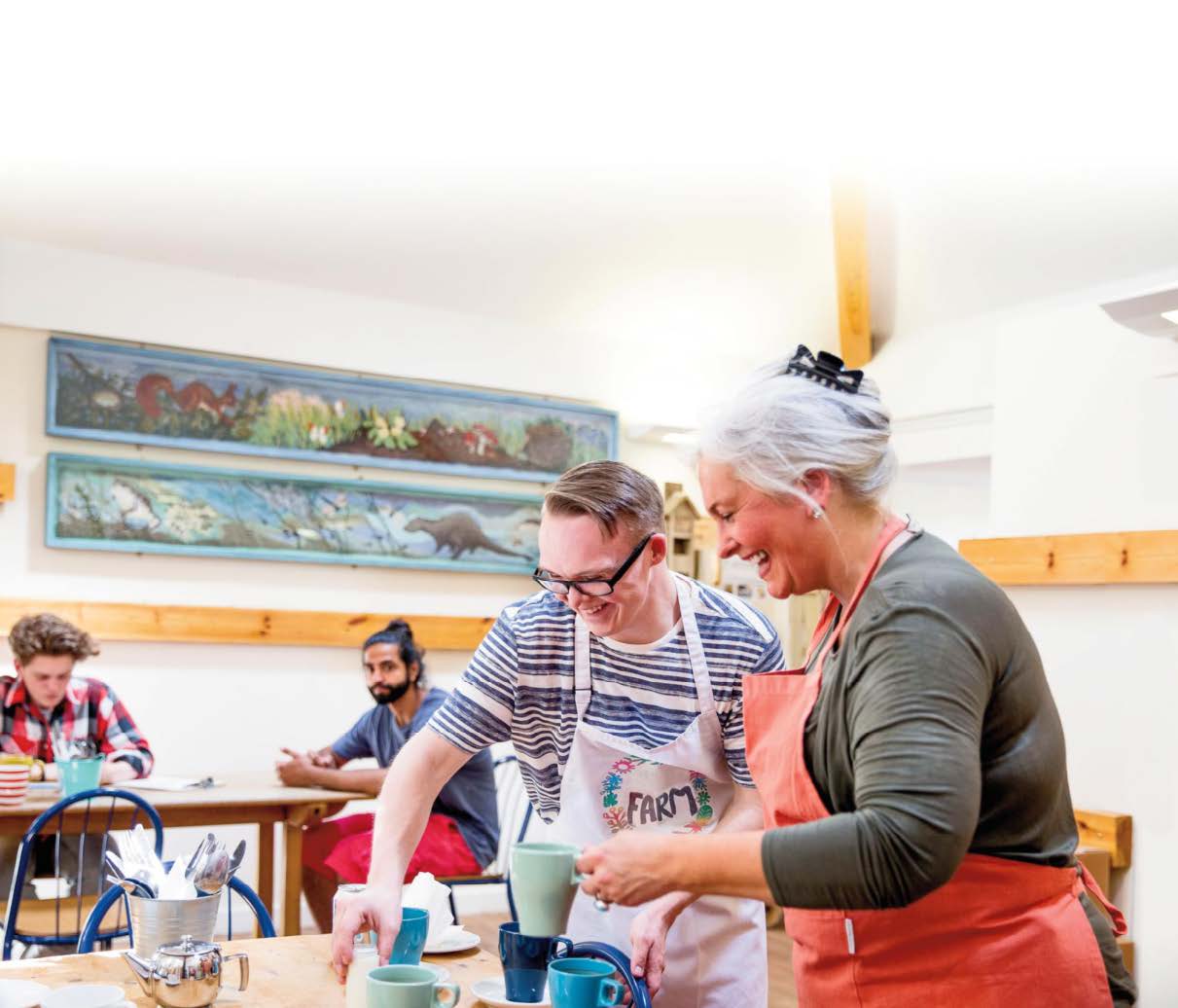BY JACKIE SCHWABE

Families with special needs members often have unique circumstances that make having a 9-to-5 job nearly impossible. To make things more complicated, many families with special needs members also have additional expenses. Quite a conundrum, isn't it? When our personal journey started, we were told that the Applied Behavior Analysis (ABA) therapy our daughter needed was going to require 30 to 40 hours of in-home parental supervised therapy and we needed to pay for a fair amount of it. This news created an urgent need get creative with how we could make a living and provide a life with possibilities for our daughter.
This article provides resources on how to start a business as a family with special needs members, or for the family member with the special needs, as well as some tips for getting creative. Hopefully you are pleasantly surprised with the available resources as well as with the number of successful business run by family members with special needs.
HOW TO START A BUSINESS IN 9 STEPS
How do you start a business anyway? The good news is you start a business the same way, whether you do or do not have special needs. Depending on the resources you use, you will find a lot of blueprints for how to start a business. Here are the nine steps that I took to create my business:
1. Evaluate Your Skills and Constraints 2. Generate Ideas Based on Your Self-Evaluation 3. Do the Research 4. Get Some Input from Others 5. Finish the Legalities 6.Write Your Business Plan 7. Finance Your Business 8. Develop Your Product or Service 9. Build Your Team
Each of these steps are described in more detail later in the article. There were two considerations in my experience that seemed different between the average everyday joe trying to start a business and someone like you and me. The first consideration is we have different constraints; common constraints might be time, money, or space, but less common constraints might include intellectual or physical constraints of our family member or ourselves. The second consideration was where funding and or support for the family member with special needs could be obtained. In some cases, there are grants or other funding programs that are available to us that are not available to others.
Admittedly, after writing this article I found myself thinking that we are all more alike than we are different in the entrepreneur space. While there are still some unique challenges faced by our community, we can still use the resources available to everyone else and there are a few special ones set aside just for us. I hope you find inspiration in the resources provided and are able to find your creative entrepreneurial spirit.
EVALUATE YOUR SKILLS AND CONSTRAINTS
One of the first things to ponder when considering a new venture, is what are you good at and what do you enjoy doing. The Wisconsin Department of Vocational Rehabilitation (DVR) has toolkits that can assist you with doing some skills assessments. Just in case you think a skills assessment is a trite exercise in futility, let's look at an example of how it helped someone in real life. A young man, one of my coworkers I worked with, has an autism diagnosis and was unable to read or write, but he loved to shred paper. (Sound familiar to anyone else with a loved one on the spectrum?) He said shredding paper calmed him down and made him happy.
His family worked with the Wisconsin DVR ( bit.ly/WI_DVR) and DVR helped him get a commercial shredder and he started a business doing confidential paper shredding for banks and medical facilities. His marketing slogan was "Confidential Shredding Services. I can't read." Instead of looking at what he was not able to do, they looked at was he was able to do and what he loved.

MORE SIMILARITIES THAN DIFFERENCES: You start a business the same way, whether you do or do not have special needs. While there are still some unique challenges faced by the special needs community, we can still use the resources available to everyone else and there are a few special ones set aside just for us.
Another consideration to ponder is what limitations do you or your family member have? For example, our family needed to have an adult home during ABA therapy. Therefore, a venture that involved daytime hours out of the house was a limitation. In our case, I started a business that created software for families to connect, care, and collaborate. I could build software anytime, so I was able to work within the time limits. You can learn more about the software here: mindlight.io.
The gentlemen above, the paper shredder, found that his limited ability to read was actually a marketing selling point. You can read about another young man that made a living from shredding paper and a few other success stories here: bit.ly/PaperAutism
Another family that was brought to my attention was Devora's family. Devora has mobility challenges. Devora also enjoys art. Together with her family and support teams they were able to find a way for her to create a product – Devora's Frames – and make a meaningful financial contribution to her family and community. Learn more about Devora at bit.ly/FramesByDevora.
GENERATE IDEAS BASED ON YOUR SELF EVALUATION
Once you know what you or your family member has for skills, what you or they enjoy, and what limitations you are trying to work within, you can use that information to generate business ideas. Devora's story is a great example of how this went well. Devora doesn't speak. Finding what she enjoyed took a little extra effort. However, her caregivers found that she smiles up a storm when she is doing art projects or watching others doing crafts. Her caregivers were able to figure out what she liked by observing her behaviors. Okay, so now what?
Devora may have liked arts and crafts, but she had limited mobility as well as a few other challenges. Her caregivers were able to figure out how to put mittens on her hands and the various supplies she needed near her so she could decorate picture frames. Once her skills, likes and dislikes, and limitations were identified, she because the artist for decorative picture frames. Now she sells the frames at craft fairs with her caregivers.
Perhaps you are a family member that is limited by your caregiving duties. You may not have physical limits, but you have limits on your time and your ability to work out of the home. Then ask yourself what can be done from home? What can you fix that drives you crazy? Can you apply your caregiving skills directly by getting certified somewhere like caregiving.com as a family caregiver that can help others? If you need some other ideas, here is a nice article on 40 business brainstorming ideas that might help get you started: bit.ly/BrainstormBusiness .
DO THE RESEARCH AND GET INPUT FROM OTHERS
Before you jump in with both feet, you are going to want to do some due diligence. The best way to make sure you are chasing an idea that might be financially fruitful is to do a little market research. You are also going to need the market research data for your business plan anyway, so you might as well start now. If you end up requesting a loan or a grant, often you are required to provide a business plan with this information before they will consider your request.
Things to consider during your research are if anyone is already creating your product or doing the same service. If you find out they are, this isn't necessarily a bad thing. If someone else is doing it, then there is a market. If no one is doing it, is there a reason? You can also look at your potential competitors or partners to see what they are doing.
One of the best ways to do research is to ask the potential customers what they think of your business idea. You can ask them on social media about the idea, even if it isn't built yet. Ask you friends and family and caregivers. Ask anyone that might be in your target market. This is the best way to find out if what you are doing may not work. It is also the least expensive place to find out your idea will not work.
Even if you are unable to ask your potential customers their ideas, check out the Quick Reference: Do the Research and Get Feedback sidebar for a few other ideas to consider for doing market research.
FINISH THE LEGALITIES
If you find the idea has some potential, it is a good idea to get the legal aspects of starting a business out of the way. If you're helping a family member with special needs, consider contacting your local DVR or case manager to see how their benefits may or may not be impacted.
The intent of getting the legalities out of the way is to ensure a few things. You don't want to worry about someone stealing your idea, a partnership that goes badly, or getting sued. A few things to consider doing are setting up the business structure and name in order to register your business. You should also consider getting a federal tax id, state tax id, any permits or licenses, trademarks, copyrights or patents, and a bank account.
These legal considerations apply if you are going to create a small business. You might only be considering a micro-enterprise. Most micro-enterprises are family-owned businesses employing one or two people. Most micro-enterprise owners are primarily interested in earning a living to support themselves and their families. The reason this is an important topic is that many governmental or DVR programs mention three types of employment: standard employment with supports, customized integrated employment, and micro-enterprises. If you are searching for grants or other funding to start a new enterprise, you might consider searching under micro-enterprises as well.
It is best to consult with a lawyer when you are just starting out so you can make sure you have covered everything you need. The lawyer can advise which of these items you do or do not need. If you need some insights into what questions to ask when looking for a small-business lawyer, here is a reference: bit.ly/LawyerQuestions
WRITE YOUR BUSINESS PLAN
While it may seem frustrating, and maybe fruitless, to write the business plan, it is a necessary part of the entrepreneurial process. While we were considering how to manage our finances with ABA thrown into the mix, we discarded what we thought was a great idea after taking the time to review the elements of a solid business plan.
There are eight essential elements to a business plan and the ones I include in my planning: 1. Title Page 2. Executive Summary 3. Business Description 4.Market Research 5. Competitive Analysis 6. Design and Development Plan 7. Operations and Management Plan 8. Financials
You can find out more details on how to write a business plan online at bit.ly/BusPlanbyEntre or bit.ly/SBABusPlan. While these are some of the standard templates that you will find in many places, if you are considering working with the DVR to assist your family member with special needs be sure to review their Custom Employment Toolkit at bit.ly/CustomSelfEmploymentToolkit. Their kit contains some great person-first business planning discussion points.

SUCCESSFUL BUSINESSES BY FAMILIES WITH SPECIAL NEEDS
Creating and running a successful business with a special needs diagnosis of some kind isn't just an excessively optimistic fairytale told by a Pollyanna. A story posted on Reason to Bake in 2017 highlights just a few people with intellectual disabilities standing up and demanding to be counted as bread winners. There is Justin Rig French of Portland, Texas who owns Mr. Rigaroo's Shaved Ice. Beau's Coffee was started by Amy Write, who has two children with Down syndrome. Michael Williams of Canada was born with autism and he started "Conversation Starters" with the help of the Young Millionaires Program. Madeline Stuart, a model from Australia who has Down syndrome is taking the fashion world by storm. Blake Pyron of Saner, Texas is the proud owner of Blake's Snow Shack. Austin Underwood of Fort Worth, Texas is owner of Austin's Underdawgs. Jasmine Prices of Encinitas, California started a sewing business with the help of her mom. Read more at bit.ly/YourMovement
FINANCE YOUR BUSINESS
You have done all the work to figure out what you want to do, how to do it, and now you have to figure out how you can afford it. A few ideas are to tap into personal savings or ask family and friends to help you get started. You can also consider SBA-guaranteed loans from banks or credit unions or get financing from angel investors and venture capital firms. Some families do home equity loans or use credit cards to start. Grants at Grants.gov might be a good place to start or SBA's Women's Business Centers all around the country. Crowdfunding on sites like Kickstarter.com is also increasing in popularity. If you are helping a special needs family member get financing, consider contacting the DVR and searching for grants for microenterprises. Other ideas for finding money to start your own business can be found here: bit.ly/MoneyforBusiness
DEVELOP YOUR PRODUCT OR SERVICE AND BUILD YOUR TEAM
Once you know you have a good idea and you have the money sbA: how to write A business plAn sba.gov/business-guide/plan-your-business/write-your-business-plan for the idea, now it is time to build your product or service and build your team. There are a number of resources out there on how to develop a product, but this resource breaks the process down into 7 simple steps: bit.ly/7StepstoDevelopment.
Having a product or service ready to sell is very exciting, but if dvr's Custom employment toolkit dwd.wisconsin.gov/dvr/pdf_files/self_employment_customized_toolkit.pdf you are trying to work around your family obligations, or you are assisting a special needs family member, it is important to consider who will be working in the business. You might expand your idea of a team and consider family members and maybe even caregivers as individuals that can assist on the team.
Last but not least, the reason I am writing this article is because I am passionate about everyone having the right to earn a living. I am a mother of four children, one with an autism diagnosis, who worked out of the home until my daughter was given her diagnosis. I had a very successful career making software applications in healthcare IT. Then, a whammy hit our family, I was forced into figuring out how to make a living and support my daughter's therapy requirements. For a moment, I thought my career was over. Once I got over myself, I was able to use my skills in software development and the limitation of working at home to help me craft the idea to create MindLight, a company that created a software application to help family members connect, coordinate, and collaborate with family, friends, and health care professionals regarding the health, safety, and education of their loved one.
It takes a village to raise a villager – but nowadays, the world is so virtual that I needed to find a way to build virtual villages. Parents like us, Amy Write, and many more mentioned in this article are finding ways to earn a living and care for their children. I hope you are inspired to think creatively and join me and many others in the ranks of successful entrepreneurs. If you need a little more inspiration, check out the Quick Reference: Successful Businesses side bar. There are no less than 10 examples of success and even more resources to help you find what might work for you. •
ABOUT THE AUTHOR: Jackie Schwabe is CEO of Mindlight, LLC. She is a Certified Caregiving Consultant and Certified Caregiving Educator. She received her BA in Management Computer Systems from the University of Wisconsin -Whitewater and her MBA in Technology Project Management from the University of Phoenix. She has been active in the area of healthcare integration, healthcare IT, telemedicine, product development, and product management for over 20 years. She has been a cross-sector, cross-discipline leadership practitioner her entire career. Jackie wakes up motivated to help others. Her mission, to provide the tools, opportunities, and connections people need to be their best self. A mother of four children — one with autism — she often says different is not less and communication happens in more ways than verbally. She cofounded MindLight, LLC as a way to technologically help caregivers.